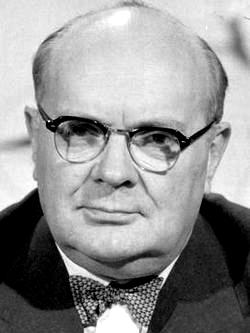
Paul-Henri Charles Spaak (French: [pɔl ɑ̃ʁi ʃaʁl spak]; 25 January 1899 – 31 July 1972) was an influential Belgian Socialist politician, diplomat and statesman who thrice served as the prime minister of Belgium and later as the second secretary general of NATO. Along with Robert Schuman, Alcide De Gasperi and Konrad Adenauer, he was a leader in the formation of the institutions that evolved into the European Union.
A member of the influential Spaak family, he served briefly in World War I before he was captured, and rose to prominence after the war as a tennis player and lawyer, becoming famous for his high-profile defence of an Italian student accused of attempting to assassinate Italy's crown prince in 1929. A convinced socialist, Spaak entered politics in 1932 for the Belgian Workers' Party (later the Belgian Socialist Party) and gained his first ministerial portfolio in the government of Paul Van Zeeland in 1935. He became the prime minister in 1938 and held the position until 1939. During World War II, he served as foreign minister in the London-based Belgian government in exile under Hubert Pierlot, where he negotiated the foundation of the Benelux Customs Union with the governments of the Netherlands and Luxembourg. After the war, he twice regained the premiership, first for under a month in March 1946 and again between 1947 and 1949. He held various further Belgian ministerial portfolios until 1966. He was Belgium's foreign minister for 18 years between 1939 and 1966.
Spaak, a convinced supporter of multilateralism, became internationally famous for his support of international cooperation, in which he hoped to include geopolitical enemies of Belgium and NATO such as the Soviet Union and its satellite states. In 1945, he was chosen to chair the first session of the General Assembly of the new United Nations. A long-running supporter of European integration, Spaak had been an early advocate of customs union and had negotiated the Benelux agreement in 1944. He served as the first President of the Consultative Assembly of the Council of Europe between 1949 and 1950 and became the first President of the European Coal and Steel Community (ECSC) between 1952 and 1954. In 1955, he was appointed to the so-called Spaak Committee studying the possibility of a common market within Europe and played an influential role in preparing the 1957 Treaty of Rome which established the European Economic Community (EEC). He received the Charlemagne Prize the same year. Between 1957 and 1961, he served as the second secretary general of NATO, becoming the only secretary general to had previously served as prime minister until Anders Fogh Rasmussen in 2009.
Retiring from Belgian politics in 1966, Spaak died in 1972. He remains an influential figure in European politics and his name is carried, among other things, by a charitable foundation, one of the buildings of the European Parliament, and a method of negotiation.
Source : Wikipedia